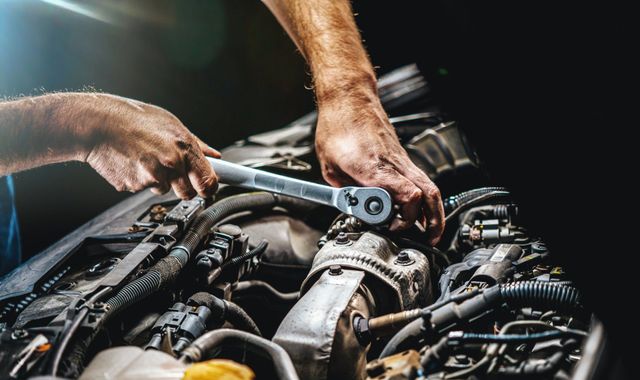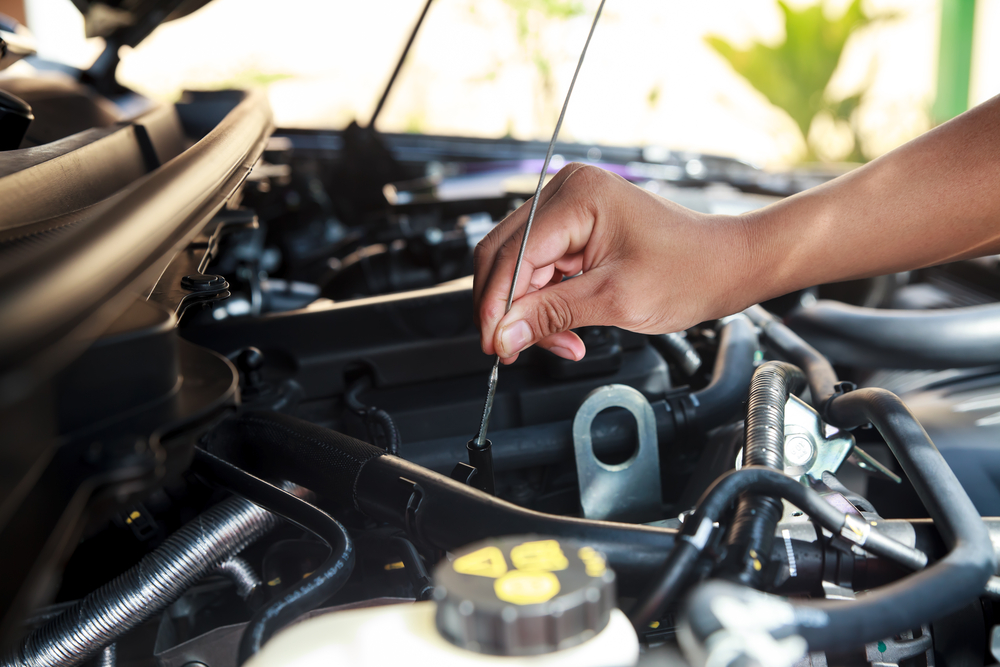All Categories
Featured
Your automobile's engine is an intricate system that relies upon lots of interconnected parts to work correctly. One of one of the most crucial parts that ensures every little thing runs smoothly is the timing belt. Though frequently forgot, the timing belt plays a vital duty in keeping your engine integrated and operating at peak efficiency. Neglecting its upkeep or substitute can lead to major, pricey damage to your engine. In this article, we'll check out the significance of timing belt replacement and why it's necessary to your engine's durability.
What Is a Timing Belt and Exactly How Does It Function? The timing belt is a rubber or reinforced composite belt that connects the crankshaft to the camshaft in your engine. These two components need to run in sync for the engine's shutoffs to open and close at the best times throughout the burning cycle. The timing belt controls this synchronization, ensuring that the valves and pistons do not collide.
![]()
As your engine runs, the timing belt consistently relocates to keep these parts straightened. With time, the belt goes through damage from heat, engine, and rubbing resonances. If it damages or comes to be loosened, the crankshaft and camshaft will certainly no longer be integrated, triggering engine misfires, loss of power, or, in the worst situation, extreme engine damage.
Why Timing Belt Substitute Is Essential. Protects Against Serious Engine Damages: If the timing belt breaks while the engine is running, the pistons can ram the valves, triggering bent shutoffs, damaged pistons, or perhaps a cracked engine block. This sort of damage typically calls for pricey and comprehensive repair work or a whole engine replacement. Changing the timing belt prior to it fails is a simple and cost-effective way to stay clear of such catastrophic consequences.
![]()
Ensures Smooth Engine Procedure: A well-maintained timing belt assists maintain your engine running efficiently by maintaining the appropriate synchronization between the crankshaft and camshaft. When the timing belt is worn or extended, the timing of the engine's valves may be off, triggering engine misfires, harsh idling, or stalling. Changing the timing belt at the recommended interval guarantees that the engine runs as it was developed to, enhancing performance and efficiency.
Conserves You Cash: Although changing the timing belt may look like a considerable ahead of time expenditure, it's even more cost effective than the expense of repairing or changing a damaged engine. The labor entailed in replacing the timing belt is a lot less pricey than repairing engine components that are damaged due to a busted belt. Regular timing belt substitute can conserve you countless dollars in the future by stopping engine failure and costly repair work.
Stops Unexpected Breakdowns: If your timing belt breaks suddenly while you're driving, it can leave you stranded and need pricey towing. In the worst instances, it can create a full engine failure that provides your car inoperable. By replacing the timing belt according to the producer's guidelines, you lower the risk of abrupt break downs and guarantee your automobile stays dependable throughout day-to-day driving and lengthy journeys.
When Should You Change Your Timing Belt? The timing belt does not last forever, and its replacement timeline can vary depending on the make and design of your lorry. A lot of manufacturers suggest changing the timing belt every 60,000 to 100,000 miles. It's essential to consult your car's owner's manual for particular guidelines, as some engines might call for earlier or later replacements.
If you're not sure concerning the problem of your timing belt, indications that it could require replacing consist of unusual engine sound (such as ticking or slapping noises), difficulty starting the engine, or inadequate engine efficiency. If needed., a specialist technician can check the timing belt for wear and tear and change it.
Conclusion. The timing belt is a necessary part of your automobile's engine, and its appropriate maintenance can conserve you from costly fixings and engine damage. Consistently changing the timing belt at the maker's suggested intervals helps make certain smooth engine operation, prevents unanticipated malfunctions, and ultimately lengthens the life of your engine. Don't neglect this critical maintenance task-- by remaining on top of timing belt substitute, you're buying the lasting health of your vehicle.
What Is a Timing Belt and Exactly How Does It Function? The timing belt is a rubber or reinforced composite belt that connects the crankshaft to the camshaft in your engine. These two components need to run in sync for the engine's shutoffs to open and close at the best times throughout the burning cycle. The timing belt controls this synchronization, ensuring that the valves and pistons do not collide.

As your engine runs, the timing belt consistently relocates to keep these parts straightened. With time, the belt goes through damage from heat, engine, and rubbing resonances. If it damages or comes to be loosened, the crankshaft and camshaft will certainly no longer be integrated, triggering engine misfires, loss of power, or, in the worst situation, extreme engine damage.
Why Timing Belt Substitute Is Essential. Protects Against Serious Engine Damages: If the timing belt breaks while the engine is running, the pistons can ram the valves, triggering bent shutoffs, damaged pistons, or perhaps a cracked engine block. This sort of damage typically calls for pricey and comprehensive repair work or a whole engine replacement. Changing the timing belt prior to it fails is a simple and cost-effective way to stay clear of such catastrophic consequences.

Ensures Smooth Engine Procedure: A well-maintained timing belt assists maintain your engine running efficiently by maintaining the appropriate synchronization between the crankshaft and camshaft. When the timing belt is worn or extended, the timing of the engine's valves may be off, triggering engine misfires, harsh idling, or stalling. Changing the timing belt at the recommended interval guarantees that the engine runs as it was developed to, enhancing performance and efficiency.
Conserves You Cash: Although changing the timing belt may look like a considerable ahead of time expenditure, it's even more cost effective than the expense of repairing or changing a damaged engine. The labor entailed in replacing the timing belt is a lot less pricey than repairing engine components that are damaged due to a busted belt. Regular timing belt substitute can conserve you countless dollars in the future by stopping engine failure and costly repair work.
Stops Unexpected Breakdowns: If your timing belt breaks suddenly while you're driving, it can leave you stranded and need pricey towing. In the worst instances, it can create a full engine failure that provides your car inoperable. By replacing the timing belt according to the producer's guidelines, you lower the risk of abrupt break downs and guarantee your automobile stays dependable throughout day-to-day driving and lengthy journeys.
When Should You Change Your Timing Belt? The timing belt does not last forever, and its replacement timeline can vary depending on the make and design of your lorry. A lot of manufacturers suggest changing the timing belt every 60,000 to 100,000 miles. It's essential to consult your car's owner's manual for particular guidelines, as some engines might call for earlier or later replacements.
If you're not sure concerning the problem of your timing belt, indications that it could require replacing consist of unusual engine sound (such as ticking or slapping noises), difficulty starting the engine, or inadequate engine efficiency. If needed., a specialist technician can check the timing belt for wear and tear and change it.
Conclusion. The timing belt is a necessary part of your automobile's engine, and its appropriate maintenance can conserve you from costly fixings and engine damage. Consistently changing the timing belt at the maker's suggested intervals helps make certain smooth engine operation, prevents unanticipated malfunctions, and ultimately lengthens the life of your engine. Don't neglect this critical maintenance task-- by remaining on top of timing belt substitute, you're buying the lasting health of your vehicle.
Latest Posts
Find Top Car Repair Care offered by Montclare Auto Repair – Drive with Confidence
Published May 24, 25
1 min read
Uncover Montclare Auto Repair’s Premier Auto Repairs and Why Drivers Trust Them
Published May 21, 25
1 min read
Discover the Greatest Auto Repair Deals in Montclare, Chicago
Published May 20, 25
1 min read
More
Latest Posts
Find Top Car Repair Care offered by Montclare Auto Repair – Drive with Confidence
Published May 24, 25
1 min read
Uncover Montclare Auto Repair’s Premier Auto Repairs and Why Drivers Trust Them
Published May 21, 25
1 min read
Discover the Greatest Auto Repair Deals in Montclare, Chicago
Published May 20, 25
1 min read